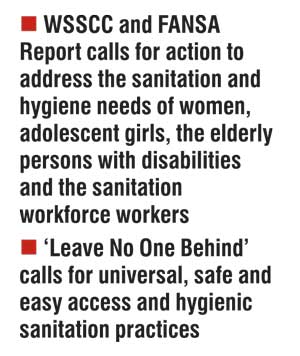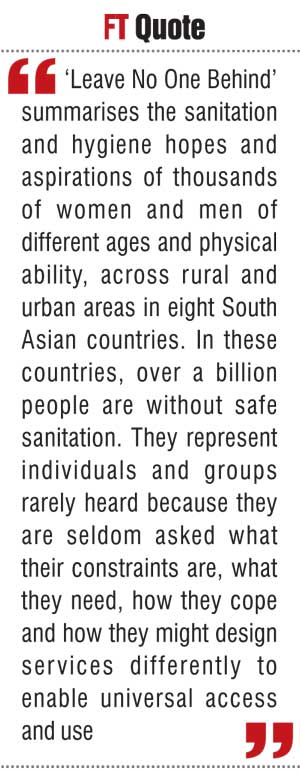Wednesday Feb 25, 2026
Wednesday Feb 25, 2026
Thursday, 21 January 2016 00:00 - - {{hitsCtrl.values.hits}}
The Water Supply and Sanitation Collaborative Council  (WSSCC) and the Freshwater Action Network South Asia (FANSA) have released a new report titled ‘Leave No One Behind: Voices of Women, Adolescent Girls, Elderly, Persons with Disabilities and Sanitation Workforce’.
(WSSCC) and the Freshwater Action Network South Asia (FANSA) have released a new report titled ‘Leave No One Behind: Voices of Women, Adolescent Girls, Elderly, Persons with Disabilities and Sanitation Workforce’.
The ground-breaking report highlights the plight of voiceless, underserved groups, and their need for safe and satisfactory sanitation and hygiene. The report, along with a companion 4-minute video, was launched at SACOSAN VI (#SACOSAN) South Asia’s leading gathering of sanitation and hygiene experts, in Dhaka, Bangladesh from 11-13 January.
The release of the report also marks the direct participation and representation of these constituencies during the event and the roll-out of a corresponding advocacy campaign.
‘Leave No One Behind’ summarises the sanitation and hygiene hopes and aspirations of thousands of women and men of different ages and physical ability, across rural and urban areas in eight South Asian countries. In these countries, over a billion people are without safe sanitation. They represent individuals and groups rarely heard because they are seldom asked what their constraints are, what they need, how they cope and how they might design services differently to enable universal access and use.

“This report, and the consultations which led to it, is a clarion call to ‘listen and learn’ by putting people at the centre and valuing individual and different needs in addition to those of whole communities,” said Archana Patkar, Program Manager at WSSCC. “It is a call also to ‘see and recognise’ the unseen and to ‘make visible’ the invisible … putting human faces and names to sanitation workers, waste pickers who empty out pits, clean drains, sweep streets and segregate our waste.”
Key findings of the report
• Users should be consulted in a disaggregated and empowering manner by the organisations responsible for building WASH facilities, so that they can take into account the specific needs and concerns of individuals and marginalised groups.
• In the case of community toilets, different excluded individuals and groups within the community must be included as partners in design, operation and maintenance planning, monitoring and upgradation to ensure that there is no discrimination in access and use.
• All the different groups consulted spoke about stigma and discrimination, due to physical, sexual or economic reasons. All groups spoke in their own way about the need for respect in order to live and work with dignity and security. They asked to be consulted and meaningfully involved in the services that affect their lives.
“South Asia has committed to eliminating open defecation by 2020 and achieving universal sanitation by 2030,” says Ramisetty Murali, the FANSA Regional Convener. “In order for this to be realised, every child, adolescent, woman, disabled or ill person, elderly man and woman, or transgender person must report safe and easy access and hygienic sanitation practices every day, irrespective of where they live, what work they do or what community they belong to. The service delivery system must be sensitive, responsive and accountable to the sanitation needs of these population groups.”
‘Leave No One Behind’ is the culmination of 55 consultations jointly conceptualised, facilitated, analysed and summarised by WSSCC and FANSA and partners across South Asia. Co-organised by approximately 70 local organisations (local governments, CBOs, NGOs, FANSA local chapters, activist networks and academia), these consultations across South Asia involved more than 2,700 adolescents, women and men – young and old, transgender people, sanitation workers engaged in the design, delivery and management of sanitation and disabled people of different age groups, gender and caste in rural, urban, peri-urban, slum and tribal settings.
WSSCC and FANSA are committed to supporting South Asia to meaningfully implement Commitment X of the Kathmandu Declaration from SACOSAN V held in Kathmandu in October 2013. Commitment X pledged “significant and direct participation of children, adolescents, women, the elderly and people with disabilities … to bring their voices clearly into SACOSAN VI and systematically thereafter”. Eight adolescent girls, women, elderly, differently–abled men and women, sanitation workers and waste pickers will speak at a key plenary session on 13 January 2016 at SACOSAN VI to share their hopes and aspirations with ministers, planners, practitioners, civil society, academia and the media.

“While the proportion of people using improved sanitation in South Asia has increased significantly over the past decade, over a billion people in the region still lack access to adequate sanitation,” says Chris Williams, WSSCC’s Executive Director. “SACOSAN VI is thus a great opportunity to examine the challenges South Asia faces as it transitions into the Sustainable Development Goals era, particularly the challenges wrought by climate change and increasing inequality.”
Supported by the eight-member South Asian Association for Regional Cooperation (SAARC) and held on a rotational basis in each member state, SACOSAN is a biennial gathering that provides a critical platform for governments and key stakeholders in South Asia to develop a regional agenda and action plans on sanitation. Under the banner ‘Better Sanitation, Better Life’ the three-day conference held in Dhaka, Bangladesh from 11 to 13 January 2016, aims to accelerate progress on sanitation and hygiene promotion in South Asia, and thus enhance the quality of people’s lives.